Mishakal, the Goddess of Healing and Compassion
Table of Contents
ToggleIntroduction
In the world of Dragonlance, where war and strife threaten the balance of Krynn, Mishakal stands as the beacon of hope, healing, and compassion. Known as the Blue Lady, the Light of Mercy, and the Goddess of Healing, she is the divine patron of healers, caregivers, and those who dedicate themselves to preserving life.
As one of the Gods of Good, Mishakal’s influence is felt in every act of kindness, every touch of a healer’s hand, and every moment where love triumphs over despair. Unlike gods who lead through war or power, Mishakal’s strength lies in gentleness, wisdom, and the unwavering belief that life is sacred.
Origins and Role Among the Gods
Mishakal was one of the first gods shaped by the High God, tasked with nurturing the world and guiding mortals toward enlightenment and peace. She stands as the consort of Paladine, the mother of compassion, and the healer of both body and soul.
While gods like Kiri-Jolith and Habbakuk fight for justice, Mishakal fights for the preservation of life itself. She teaches that true strength lies in mercy and that the greatest warriors are not those who wield swords, but those who save and protect others from suffering.
Domains and Influence
Mishakal is the goddess of:
- Healing and Restoration – Blessing healers, physicians, and clerics.
- Compassion and Mercy – Inspiring kindness, love, and understanding.
- Wisdom and Enlightenment – Teaching the importance of knowledge and peace.
- Hope and Renewal – Bringing light to the darkest of times.
She is the patron deity of clerics, doctors, midwives, and those who dedicate their lives to healing.
The Blue Lady and Her Mortal Followers
Mishakal’s followers are gentle yet strong, believing that every life is precious, even in the midst of war. They include:
- Clerics of Healing – Serving as divine healers, often found in temples and battlefields.
- Scholars and Teachers – Spreading wisdom and guiding others toward peace.
- Peacemakers and Diplomats – Seeking to resolve conflicts without bloodshed.
- Midwives and Caregivers – Bringing life into the world and tending to the sick.
Symbols and Worship
Mishakal is depicted as a radiant woman in flowing blue robes, often holding a glowing staff. Her eyes are gentle yet filled with wisdom, reflecting the boundless compassion of a mother watching over her children.
Her sacred symbols include:
- A blue infinity symbol – Representing the eternal cycle of life and healing.
- A crystal staff – A relic of divine healing power.
- A pair of open hands – Signifying mercy and protection.
Temples dedicated to Mishakal are sanctuaries of peace, offering healing, guidance, and protection to all, regardless of background or allegiance.
Worship and Rituals
Unlike gods who demand grand ceremonies, Mishakal’s worship is quiet and personal, found in acts of kindness, prayers for the sick, and moments of forgiveness.
Key rituals include:
- The Blessing of Hands – A ceremony where healers dedicate their hands to her service.
- The Light of Mercy – A night of prayer where followers send lanterns into the sky, symbolizing hope.
- The Vigil of Healing – A sacred time where clerics fast and meditate, asking for Mishakal’s guidance.
Allies and Rivals Among the Gods
As the heart of the Gods of Good, Mishakal stands closest to:
- Paladine, her consort, who shares her vision of a just and merciful world.
- Majere, god of wisdom, who values her teachings of enlightenment.
- Kiri-Jolith, the warrior of honor, who respects her belief in protecting the innocent.
Her greatest enemies are the Gods of Evil, particularly:
- Morgion, the god of disease, who spreads sickness and suffering.
- Chemosh, the god of undeath, who seeks to corrupt the natural cycle of life and death.
- Takhisis, the Queen of Darkness, who twists love into manipulation and mercy into weakness.
Mishakal in Legends and Stories
The Crystal Staff of Mishakal
One of the most sacred relics of Krynn is the Crystal Staff of Mishakal, a powerful artifact said to contain her divine healing essence. According to legend, it was gifted to a mortal healer during a time of great war, allowing her to restore the wounded and turn the tide of battle without bloodshed. The staff has since appeared throughout history, always finding its way to those in need.
The Goddess Who Wept
Another story tells of a time when Mishakal wept for the suffering of mortals, her tears falling upon the land. Where they touched the earth, wells of healing water sprang forth, becoming sacred places of restoration. It is said that even today, some hidden springs in Krynn carry her divine blessing, able to cure even the gravest of wounds.

